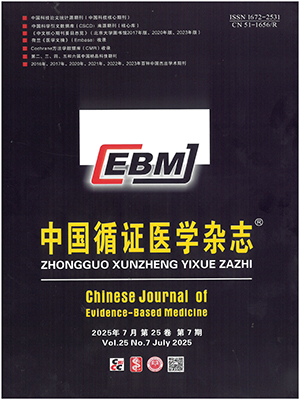| 1. |
Cao W, Chen HD, Yu YW, et al. Changing profiles of cancer burden worldwide and in China: a secondary analysis of the global cancer statistics 2020. Chin Med J (Engl), 2021, 134(7): 783-791.
|
| 2. |
Sung H, Ferlay J, Siegel RL, et al. Global cancer statistics 2020: GLOBOCAN estimates of incidence and mortality worldwide for 36 cancers in 185 countries. CA Cancer J Clin, 2021, 71(3): 209-249.
|
| 3. |
Smyth EC, Nilsson M, Grabsch HI, et al. Gastric cancer. Lancet, 2020, 396(10251): 635-648.
|
| 4. |
Wagner AD, Syn NL, Moehler M, et al. Chemotherapy for advanced gastric cancer. Cochrane Database Syst Rev, 2017, (8): CD004064.
|
| 5. |
Ajani JA, D'Amico TA, Bentrem DJ, et al. Gastric cancer, version 2. 2022, NCCN clinical practice guidelines in oncology. J Natl Compr Canc Netw, 2022, 20(2): 167-192.
|
| 6. |
Högner A, Moehler M. Immunotherapy in gastric cancer. Curr Oncol, 2022, 29(3): 1559-1574.
|
| 7. |
Sun YT, Lu SX, Lai MY, et al. Clinical outcomes and biomarker exploration of first-line PD-1 inhibitors plus chemotherapy in patients with low PD-L1-expressing of gastric or gastroesophageal junction adenocarcinoma. Cancer Immunol Immunother, 2024, 73(8): 144.
|
| 8. |
Janjigian YY, Shitara K, Moehler M, et al. First-line nivolumab plus chemotherapy versus chemotherapy alone for advanced gastric, gastro-oesophageal junction, and oesophageal adenocarcinoma (CheckMate 649): a randomised, open-label, phase 3 trial. Lancet, 2021, 398(10294): 27-40.
|
| 9. |
Rha SY, Oh DY, Yañez P, et al. Pembrolizumab plus chemotherapy versus placebo plus chemotherapy for HER2-negative advanced gastric cancer (KEYNOTE-859): a multicentre, randomised, double-blind, phase 3 trial. Lancet Oncol, 2023, 24(11): 1181-1195.
|
| 10. |
Xu RH, Oh DY, Kato K, et al. LBA80 tislelizumab (TIS) plus chemotherapy (Chemo) vs. placebo (PBO) plus chemo as first-line (1L) treatment of advanced gastric or gastroesophageal junction adenocarcinoma (GC/GEJC): final analysis results of the RATIONALE-305 study. Ann Oncol. 2023, 34: S1320-S1321.
|
| 11. |
Husereau D, Drummond M, Augustovski F, et al. Consolidated health economic evaluation reporting standards 2022 (CHEERS 2022) statement: updated reporting guidance for health economic evaluations. Value Health, 2022, 25(1): 3-9.
|
| 12. |
Jiang Y, Li Y, Wang LXW. Cost-effectiveness analysis of nivolumab plus standard chemotherapy versus chemotherapy alone for the first-line treatment of unresectable advanced or metastatic gastric cancer, gastroesophageal junction cancer, and esophageal adenocarcinoma. Int J Clin Pharm, 2022, 44(2): 499-506.
|
| 13. |
Shu Y, Ding Y, Zhang Q. Cost-effectiveness of nivolumab plus chemotherapy vs. chemotherapy as first-line treatment for advanced gastric cancer/gastroesophageal junction cancer/esophagel adenocarcinoma in China. Front Oncol, 2022, 12: 851522.
|
| 14. |
蔡克强, 张秀华. 帕博利珠单抗联合一线化疗方案治疗晚期胃癌的药物经济学评价. 药物流行病学杂志, 2022, 31(12): 823-827, 831.
|
| 15. |
Cao X, Zhang M, Li N, et al. First-line nivolumab plus chemotherapy versus chemotherapy alone for advanced gastric cancer, gastroesophageal junction cancer, and esophageal adenocarcinoma: a cost-effectiveness analysis. Ther Adv Med Oncol, 2023, 15: 17588359231171038.
|
| 16. |
Marupuru S, Arku D, Axon DR, et al. Cost-effectiveness analysis of nivolumab-chemotherapy as first-line therapy for locally advanced/metastatic gastric cancer: a United States payer perspective. Expert Rev Pharmacoecon Outcomes Res, 2023, 23(7): 831-841.
|
| 17. |
Lang Y, Lin Y, Li D, et al. Pembrolizumab alone or in combination with chemotherapy versus chemotherapy for advanced gastric cancer: a cost-effectiveness analysis. Cancer Med, 2023, 12(18): 18447-18459.
|
| 18. |
Morimoto K, Moriwaki K, Shimozuma K, et al. Cost-effectiveness analysis of nivolumab plus chemotherapy vs. chemotherapy for patients with unresectable advanced or metastatic HER2-negative gastric or gastroesophageal junction or esophageal adenocarcinoma in Japan. J Gastroenterol, 2023, 58(12): 1188-1197.
|
| 19. |
Zhu Y, Liu K, Zhu H, et al. Immune checkpoint inhibitors plus chemotherapy for HER2-negative advanced gastric/gastroesophageal junction cancer: a cost-effectiveness analysis. Therap Adv Gastroenterol, 2023, 16: 17562848231207200.
|
| 20. |
Li W, Wan L. Cost-utility of sintilimab plus chemotherapy vs. chemotherapy as first-line treatment of advanced gastric or gastroesophageal junction cancer in China. Expert Rev Pharmacoecon Outcomes Res, 2024, 24(5): 671-678.
|
| 21. |
冯冰, 高宁, 高胜男, 等. 替雷利珠单抗联合化疗一线治疗局部晚期不可切除或转移性胃或胃食管结合部腺癌的成本-效果分析. 中国药房, 2024, 35(8): 967-971.
|
| 22. |
Li W, Wan L, Zhang J. Cost-effectiveness of tislelizumab plus chemotherapy vs. chemotherapy as first-line treatment of PD-L1 positive advanced gastric or gastroesophageal junction adenocarcinoma from a Chinese perspective. Expert Rev Gastroenterol Hepatol, 2024, 18(6): 293-301.
|
| 23. |
Zheng Z, Song X, Cai H, et al. Pembrolizumab combined with chemotherapy versus placebo combined with chemotherapy for HER2-negative advanced gastric cancer in China: a cost-effectiveness analysis. Expert Rev Pharmacoecon Outcomes Res, 2024, 24(8): 1017-1025.
|
| 24. |
Lang W, Deng L, Lu M, et al. Cost-effectiveness analysis of pembrolizumab plus chemotherapy versus placebo plus chemotherapy for HER2-negative advanced gastric/gastroesophageal junction cancer in the Chinese healthcare system. Expert Rev Pharmacoecon Outcomes Res, 2024, 24(8): 1027-1042.
|
| 25. |
Xiang Z, Ma L, Fu Y, et al. Cost-effectiveness analysis of first-line sintilimab plus chemotherapy vs. chemotherapy alone for unresectable advanced or metastatic gastric or gastroesophageal junction cancer in China. Front Pharmacol, 2024, 15: 1411571.
|
| 26. |
Zhou J, Oy-Yang W, Yin X, et al. Cost-effectiveness of nivolumab plus chemotherapy for advanced gastric/gastroesophageal junction/esophageal adenocarcinoma in the United States. Eurasian J Med Oncol, 2025, 9(1): 193-203.
|
| 27. |
Tang B, Yan X, Sheng X, et al. Safety and clinical activity with an anti-PD-1 antibody JS001 in advanced melanoma or urologic cancer patients. J Hematol Oncol, 2019, 12(1): 7.
|
| 28. |
Reck M, Rodríguez-Abreu D, Robinson AG, et al. Pembrolizumab versus chemotherapy for PD-L1-positive non-small-cell lung cancer. N Engl J Med, 2016, 375(19): 1823-1833.
|
| 29. |
Horn L, Mansfield AS, Szczęsna A, et al. First-line atezolizumab plus chemotherapy in extensive-stage small-cell lung cancer. N Engl J Med, 2018, 379(23): 2220-2229.
|
| 30. |
Gandhi L, Rodríguez-Abreu D, Gadgeel S, et al. Pembrolizumab plus chemotherapy in metastatic non-small-cell lung cancer. N Engl J Med, 2018, 378(22): 2078-2092.
|




